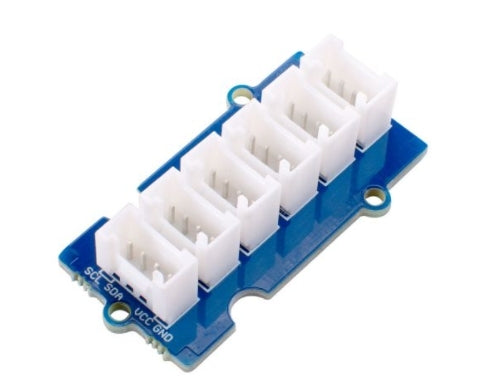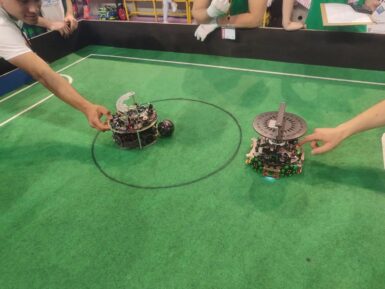
Grove - I2C Hub (6 Port)
Grove - I2C Hub (6 Port) is an I2C expansion interface board, compared with the old Grove - I2C Hub, the same size, two more connectors, almost half the price!
Overview
We've already released the Grove - I2C Hub (4 Port), now comes the 6 port version, the same size, two more connectors, almost half the price!
As you may know, the 7 address length I2C bus allows up to 128 I2C devices to access.
At present, there are over 80 Grove I2C modules in Seeed, however, normally only 1 or 2 Grove I2C connectors are available on the Seeeduino Board or the Grove Base Shield. What if we need to use multi Grove I2C modules in the system? The answer is Grove - I2C Hub (6 Port).
There are 6 Grove connectors in this hub, one input, five output, or you can even connect one hub with another, so that more devices can be plugged in.
Not only I2C but also can be used to control several synchronous change devices (like LEDs).
We did a survey and gathered some feedback about the old Grove I2C Hub (4 Port), many users mentioned that the 4 slots are not sufficient, so we add two more and keep the same 20*40mm size.
SeeedStudio always values the voice of our customers, and we appreciate our customers helping us grow and make us better.
Get Inspired

Learn to set up an Arduino Nano RP2040 Connect to use MicroPython.

Team Ikaro is a vibrant group of high school students from the Pacinotti Archimede Institute in Rome, sharing a strong passion for electronics and turning heads in the world of robotics! Specializing in Soccer Lightweight games (where robot-soccer players compete to score goals on a miniature field), they clinched the first place at the Romecup 2024 and won Italy’s national Robocup in Verbania earlier this year – earning the right to compete in the world championships in Eindhoven, where they placed third in the SuperTeam competition. The brains behind the bots Utilizing the versatile Arduino Nano RP2040 Connect, the team has crafted highly efficient robots that feature ultrasound sensors, PCB boards, a camera, four motors, a solenoid kicker and omni-directional wheels, all meticulously assembled in the school’s FabLab. Mentored by professor Paolo Torda, Team Ikaro exemplifies the spirit of innovation and teamwork bringing together three talented students: Francesco D’Angelo, the team leader, focuses on system design and mechanics; Flavio Crocicchia, the software developer, ensures the robots’ brains are as sharp as possible; Lorenzo Addario specializes in camera software, making sure the robots can “see” and react swiftly on the field. Their combined efforts have led to a seamless integration of hardware and software, and established a foundation of passion and ambition for future success in their careers. Future goals After their first taste of global competition, Team Ikaro is determined to continue refining their robots, leveraging every bit of knowledge and experience they gain – whether in the classroom, lab, or live challenges. At Arduino, we are proud to sponsor such brilliant young minds and look forward to seeing what they will accomplish next!








